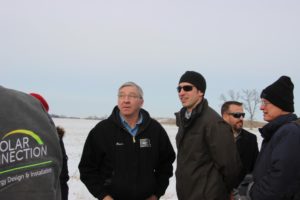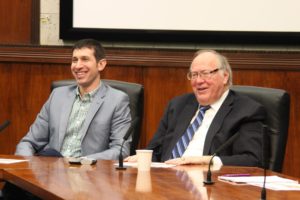
Greetings from St. Paul,
Over the last few weeks, I have been traveling the district holding meetings with constituents in preparation for the 2018 legislative session. The feedback I received from these meetings, just like the emails, phone calls, letters, and visits I receive daily from constituents, is the most important tool I have to help me represent you to the best of my ability.
As we begin the 2018 legislative session, I want to provide a quick review of the historic accomplishments of 2017. Last session, we laid a strong foundation of bipartisan success – we immediately passed emergency premium relief to help families that were being affected by high health insurance prices, and we followed that up with reforms – like our successful reinsurance program – which helped stabilize these out of control health insurance premiums over the long term.
We also passed a REAL ID fix and lifted the ban preventing liquor stores from choosing to do business on Sundays. These were two issues that had been languishing around the legislature for years, but we finally got them done.
We passed a bonding bill that delivered full funding for the Lanesboro Dam, the second phase of Education Village, and other critical infrastructure projects.
But most importantly, we passed a responsible state budget that provided the biggest long-term investment in roads and bridges in a decade (without raising gas taxes or tab fees); the biggest tax relief package in almost twenty years (targeted at middle income families, senior citizens, farmers, students, and small businesses and it included income tax reciprocity for Minnesotans who work in Wisconsin and increased funding for cities and counties); and increased funding for our schools, including E-12 and higher education.
As we look ahead, we certainly have our work cut out for us during this shorter 2018 legislative session. I’m optimistic that we will have a productive session with bipartisan efforts on the important issues facing our state, including those listed below, which I anticipate will be the priorities of the session.
Tax conformity will save Minnesotans even more money
The federal tax overhaul passed by Congress in December presents a significant opportunity for Minnesota. The federal bill will provide savings for most taxpayers, but because Minnesota is such a high tax state, we need to update our code to take advantage of the federal changes.
Additionally, we must act to make sure it is easier for Minnesotans to file their state tax returns. The federal tax overhaul made it much simpler to file your federal returns, but if Minnesota doesn’t react, filing your state income tax return will be very complicated because of the way taxes are calculated in Minnesota. A tax conformity bill will address this issue.
Holding government accountable to fix MNLARS
Minnesota’s new system for licensing vehicles, MNLARS, is off to a poor start. It has been plagued with delays and errors, and Deputy Registrars have reported their livelihoods are being threatened by significant revenue losses. Recently, we learned that officials in charge of developing MNLARS, including the governor’s office, did not act on warnings that the system was not ready.
We’ve been soliciting public feedback about MNLARs via MNLARSmess.com. If you have had an experience, please tell us about it. Your information will be kept private, but your stories will help drive change.
In 2018, one of our top priorities will be holding government accountable for failures like MNLARS and getting the system fixed.
Addressing the opioid/drug epidemic
The opioid addiction crisis has finally gained the attention it deserves. Opioid addiction has tormented too many families already, and getting it under control will be high on our agenda. Last year, a bipartisan group of legislators introduced a series of opioid reforms. Many of these will be given serious consideration this year.
Rebuilding and repairing Minnesota’s infrastructure
Recently I joined the Senate Capital Investment Committee for a tour of proposed bonding projects in our area, like the Fillmore County Veterans Home. There will likely be a strong demand for another bonding bill this year, and the committee has been touring the state learning about the various proposals.
Not only did members of the committee see our southeastern Minnesota priorities up close, they were also able visit success stories like Hiawatha Bluffs Living Center to see what we can accomplish when we invest our resources in the right places.
It is still early to say how big a potential bill might be and what projects might be included, but it is important that we use bonding money to focus on our most urgent statewide needs. I believe a reasonable bonding bill is very doable this session and I will continue to be a strong advocate for Houston, Fillmore, and Winona counties.
As always, your feedback is extremely important to me and I encourage you to share your input on the issues being discussed here at the Capitol. If you have any questions, thoughts, or ideas, please send me an email at sen.jeremy.miller@senate.mn or call my Capitol office at 651-296-5649. It’s a great honor to serve as your State Senator.
Sincerely,


